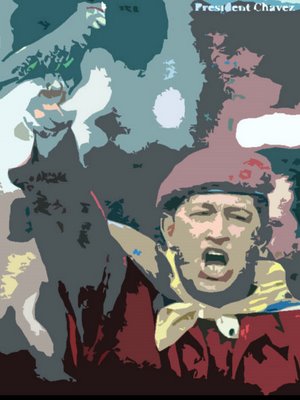
In yesterday’s New York Times, there is an article on Venezuela as the latest destination for revolution seekers of the developed world, the political version of adventure tourism for the Birkenstock set. Drawn by the rhetorical extravaganzas of Hugo Chavez, as well by “the possibility of a better world in Venezuela,” against naked American imperialism, strong-armed buffoonery and globalization, leftist Europeans and North Americans have been flocking to Venezuela and its capital, Caracas, to experience what the Times implies is the latest trend in revolutionary politics: The Bolivarian Revolutionary Experience. Or, as Mr. Gordo put it in an email today, “Caracas is the biggest theme park in the world. The Revolution is fashionable and fun!!!”
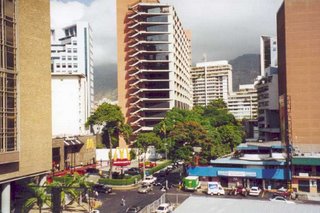
The situation in Venezuela is difficult to describe for a number of reasons, not the least of which is the problem of criticism itself. The old leftist slogan “you’re either part of the solution or part of the problem” reveals not only a profound anti-intellectualism but also a reductive, simplistic relationship to the world that, in my opinion, does not augur true solutions. Yet, a surprising number of leftists and academics, readers of Stuart Hall, hold on to this view, and to express doubts about Chavez is akin to declaring yourself a part of the oligarchy. But such cartoonish understandings of the world are exactly what I would like to question here. What I want to do here is think, not sloganeer. I, for one, have had quite enough of that!
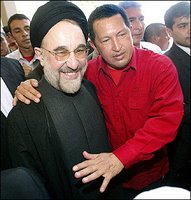
The Left thinks of Chavez as the embattled leftist (and Black/racialised) democratic leader of South America, resisting the CIA, American hegemony, and right-wing coupsters. The Right considers Chavez a leftist dictator on the Fidel Castro model, who threatens regional stability and consorts with pariah states like Iran and Zimbabwe. The truth, as always, lies someplace in between. Hugo Chavez is considered in the West a leftist (except, ironically, by the Venezuelan left, which considers Chavez as having displaced a true left in the country), and rhetorically he fits the bill, but in practice he and George W. Bush have quite a lot in common, in terms of methodology. Both have moved aggressively to control the state and harness it to their personal politics. Both have assumed mythic proportions (in their own minds, at the very least) as saviours of the nation, have politicised and compromised civil society, both preside over deeply split electorates, and are controversial and divisive leaders who relish conflict and the grand gesture.
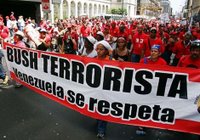
This similarity is lost for many developed world leftists, including many academics, who are attracted to Chavez because of his anti-imperialist stances, his “Bolivarian Revolution,” and his open disdain for George W. Bush. Or, as the Times story comments:
Referring to American visitors, an American diplomat in Caracas, who could not speak on the record because of embassy rules, echoed the concerns, saying, “Come down here and get your consciousness raised, absolutely.” He added, “My only request of them is that they try to get the other side of the story.” Emily Kurland, a 26-year-old social worker originally from Chicago, said that was exactly what she and the others here were getting. “They're frustrated with Bush, frustrated with not being listened to, frustrated with Iraq,” said Ms. Kurland, speaking in the Caracas house she shares with several foreigners. “They don't trust Fox News. They don't trust the mainstream news. They want to see with their own eyes what's happening here.”
Leaving aside for now the question as to why Americans, if they are frustrated with the political situation in the USA, would go to Caracas, life on the ground in Venezuela is much more fraught and complicated than one would gather from the work of Amy Chua, Richard Gott, or the “documentary” The Revolution Will Not Be Televised, which made the art house rounds a couple of years ago. The “opposition” is not just blonde millionairesses and suits. It is also working people, the small middle-class, intellectuals and journalists, artists and writers, and is profoundly multi-racial. But the image that persists in the Western leftist mind is the binary between oligarchy/capital/CIA/bad and democracy/revolution/people power/good. We have seen this binary before in the West’s relation to Latin America (anyone remember Cuba?). What the Western Left seems to be caught up in, yet again, is the Che Complex.
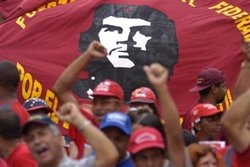
The Che Complex refers, of course, to the infamous guerrillero Che Guevara, hero of the Cuban Revolution and subject of the extremely saccharine film The Motorcycle Diaries, which in short order serves up the heroic beginnings of this fighter for the people. Now, mind you, I am naturally cynical. It is hard for me to believe in simple, one-step solutions or mantras that, while comforting, are inane in their naïve understanding of the world. I am reminded of a colleague in graduate school, a Puerto Rican activist, who would constantly chirp, “The problem is we need to teach the working class about transnational capitalism.” While this indeed may be a laudable goal, the working class, at least in the West, would want to figure out just how to get its share of that transnational pie, not to overturn the system. Isn’t that the history of the American working class, after all? Polemic rarely captures the complexity of human desires, which is both its preciousness and its danger. The history of the twentieth century is built on the bones of millions crushed under polemic, from The Great War to the Khmer Rouge, and every horror in between. If the grand revolutionary experiments of the past century were committed to lofty but bloody utopian ideals, we have clearly not lost our taste for that unattainable fantastical pleasure.

Che, of course, has persisted in being a symbol of resistance, as evidenced not only by The Motorcycle Diaries, but by his image on t-shirts, leaflets, posters, and other paraphernalia of resistance, however understood. And this is where the Che Complex lives, in the universe of symbolic representation. As the Western Left has turned the real Che into a paper tiger, a hero for easy consumption, a reference and shorthand for the dissent of rock bands and sullen suburban teenagers, The Che Complex refers to the dismaying habit of the Western Left to aggrandize symbols of Latin American resistance with little or no understanding (or care) for the histories or tangible effects of these politics on the people living under these revolutionary regimes. Some good political examples of the Che Complex would be, aside from Che (natch): Fidel Castro, Salvador Allende, (at one time) The Sandinistas, (at election time) Lula, and most recently Bolivia’s Evo Morales. Some good cultural examples would be Frida Kahlo, Gabriel García Marquez and the literary genre of magical realism, and the Buena Vista Social Club. I include the cultural along with the political because the Che Complex is a holistic approach to Latin American authenticity: radical, fecund, disordered, natural, native, real, as opposed to our synthetic, processed, unnatural lives in the developed West. What differentiates the Che Complex from old-fashioned exoticism is its explicitly leftist political orientation, its romanticisation of Latin American socio-political upheavals, and an interest in revolutionary transformation that for many in the West seems impossible in their own national milieu. The Che Complex is at heart transference, a displacement of one’s own desires for political transformation onto others, and as such, also reveals the psychosocial dimensions of this transference for the Western mind.
This gesture is also one that is incredibly problematic, for it reproduces the historic and unequal colonial dynamic of centre and margin, just with a progressive political face. As the West has used the developing world “other” for centuries to define itself, as what it is not, so again this system exists in the Che Complex: while we, for whatever reasons, cannot effectively battle the forces of capitalism and corruption in the metropole, our brown brothers and sisters in the outré-mer can.
I remember getting into an argument at Prestigious Eastern U. over Communism in Africa with a light-skinned, upper class black woman, one of those types that years later you remember as really fucking with your mind. The disagreement centred on democracy and political freedom, which I was arguing (silly girl that I was, and still am) was important, while this woman, who we came to call Lady D, argued that if governments provided food and medicine and education, than political freedom wasn’t so important. When I countered whether she would like to live under such a system, she responded that while such a thing would not be good for her, it didn’t mean it wasn’t good for others. This woman was remarkably successful at PU, primarily because she was so angry (she taught me the value of a line and an attitude), and anger was very “in” in the eighties. No one stopped to question exactly why this woman in particular would be angry. She came from a comfortable home, with professional parents, had gone to private school, was physically beautiful, intellectually talented, economically comfortable, and was now at PU. So unbothered by these complications were we that no one questioned her radical politics when she returned sophomore year with a $500 weave. But I think of this argument we had, the first week of school, as indicative of a kind of limited thinking, a type of wish-fulfillment and a fantasy projection that was on the face of it altruistic but beneath the wholesome exterior remarkably narcissistic and self-aggrandizing. Her troublesome privilege could be ameliorated through “good ideological work” on behalf of poor, marginalised others. That this principle also seems at work in so much contemporary scholarship (i.e. Cultural Studies "radicalism") only highlights its tenuousness as an organising concept for effective socio-cultural political action and change.

The current fetish of Hugo Chavez in the developed world strikes me as an aspect of the same phenomenon. I always think that a good test of politics is to measure it upon yourself: a self-test. For instance, what would American leftists feel if they found themselves at odds with a presidential administration, and exercised their democratic right to request a recall election. Then, after much hemming and hawing and protesting and pressure on the part of the government, the election took place, favourable to the administration but with dubious and unverifiable results (confirmed by international observers with their eyes more on the unstable price of oil than democratic irreugularities; in other words, brought to you by the same people who confirmed an Ohio win for Bush). And subsequent to “winning” the election, the administration then obtained a list of those voters who had signed the petition for recall, and distributed the list publicly, and began to bar these voters from civil services (such as the right to a passport or the ability to obtain foreign currency), discriminate against them in government and university employment, and began calling these voters by name on television and in the press traitors, oligarchs, coup plotters, squalid ones, and prosecuting them for treason in courts packed with judges selected for their loyal politics to the regime. Would that be OK?
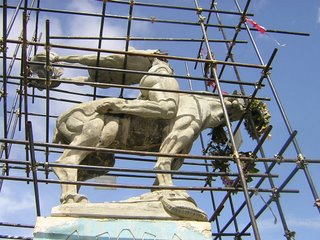
Well, that is exactly what has happened in Venezuela. The veil of the Che Complex excuses these “excesses” from censure by Western leftists. “Venezuela is different!” we hear. How is Venezuela, or any developing world nation that different? People in Venezuela and other developing world countries aren't from Mars, after all. “They have critical poverty!” we are told. Well, there is a lot of critical poverty in the USA. “There is an extreme difference between the have and the have-nots, and an oligarchy that controls business and the press!” people say. How would one describe the USA any differently?
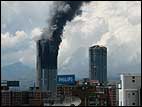
If we do this self-test in honestly, most of us would agree that such political conditions as exist in Venezuela under the Bolivarian regime of Hugo Chavez, if performed here by, say, the current administration of George W. Bush, would be unacceptable, even at this very moment when US rightists are feverishly working to overturn the American republic. Then why are they acceptable in Venezuela, or indeed any developing world nation? To reach the conclusion that such authoritarianism is acceptable in the developing world is uncomfortably close to colonialist visions of the brown or black or yellow “other” as being incapable of appreciating culture, running government efficiently, and being eligible for humanistic Enlightenment values. “Democracy” for the West, revolutionary kleptocracy for everyone else, is hardly an inspiring slogan, but it seems to fit here.
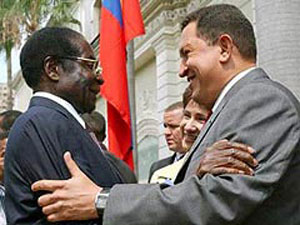
Chavez is not a leftist, he is not a rightist, nor is he truly a democrat. He is an authoritarian, the paradigm of the Latin American strong man. Chavez has one true love, and that is himself. Let’s not forget he was a member of the army, never a good sign for Latin American democracy. Unlike Allende or Lula, he does not represent the traditions of Latin American democracy, but rather its old bugaboo, the caudillo. This is a leader who has stated in his turgid six- to eight-hour televised speeches, which occur every week, that he plans to be President forever. This is someone who has appointed his aged father as the governor of the state of Barinas and his brother to an important cabinet position. This is a democratic leader who absurdly proclaims that Condie Rice has a lustful crush on him on national television and blows her kisses. This is a revolutionary patriot who consorts with former revolutionary now kleptocrat Robert Mugage, calling him a hero to his people. This is the radical who seeks total control over the independent banking system and has appointed his cronies to (and overseen corruption at) Petroleos de Venezuela (PDVSA) and the entire infrastructure of government ministries, including most notably the Consejo Nacional Electoral (CNE). The recent closing and collapse of the highway bridge leading from Simon Bolivar International Airport in Maiquetia to Caracas has become a symbol for the ineptitude and lack of focus of a revolutionary administration that has now had eight years to demonstrate its governing value (ringing any US bells?).
Rhetoric, sloth, radicalism, corruption, modernity, collapse, revolution, coercion, dreams of the state, nightmares of government.
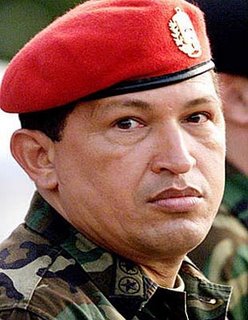
While Chavez purportedly represents a change from the sclerotic Venezuelan democracy of the past, he is ironically following in its footsteps, harnessing the power of what Coronil calls "the magical state,” where oil money and the notion of state power come to represent an easy solution to the profound social and economic crises that face Venezuela. And Chavez is an aspect of these crises, for his presence and rhetoric and policies towards the poor do respond, at least on the level of discourse, to real, tangible problems in Venezuela. The conundrum for Venezuela, and the thinking Left in the rest of the world, is whether or not this is true reform, or the progressive rhetorical trimmings of a kleptocratic loon.

The depressing truth is that Chavez represents the flip side of the criminal administration we currently have here in the USA in its rapaciousness and ideological excesses, and the love affair the global Left has for him is symptomatic of its intellectual exhaustion more than anything else. Didn’t we get enough of this with Fidel? We need to wake from our Che Complex dreams, and dedicate ourselves to forthrightly and deliberately fixing our own world (as opposed to transferring our utopian fantasies onto others in a colonial modality), and rebuilding effective leftist strategies, effecting change here as well as there (for after all, Chavez does not emerge sui generis, he represents a true crisis in Venezuelan society, as Bush represents a true crisis in American democracy). What we need is more thinking, and less compulsory and knee-jerk hero-worship. For in the words of Tina Turner, we don’t need another hero.



31 comments:
This article by Alvaro Vargas Llosa
identifies 09 reasons "Why The Left Should Cringe at the Mention of Hugo Chávez".
They are very telling:
1. CHÁVEZ MAKES WAR, NOT LOVE.
2. CHÁVEZ IS A HEAVY PRIVATIZER.
3. CHÁVEZ CAN’T HAVE ENOUGH OF U.S. BUSINESS.
4. CHÁVEZ WANTS TO BECOME A WORLD BANK.
5. CHÁVEZ POLLUTES THE ENVIRONMENT.
6. CHÁVEZ ADOPTS THE PINOCHET LINE ON THE FREEDOM OF THE PRESS.
7. CHÁVEZ HAS INCREASED POVERTY.
8. CHÁVEZ INVITES FOREIGN DOMINATION.
9. CHÁVEZ SENDS MONEY ABROAD THAT IS NEEDED AT HOME.
http://www.independent.org/newsroom/article.asp?id=1678
You will enjoy this piece.
By the way, your analysis is sharp.
May I ask Oso, who are you? Not everyday does one read such a revealing account of what goes on in La Tierra de Gracia and how its troublesome issues are played for political gain by the intellectually hollow Western Left.
Further, I reckon you left out one important element in your description of how the Western Left perceives the Orwellian project of Hugo Chavez: racism.
Terrific piece, absolutely terrific!
Hee hee...
Something happened between this:
But such cartoonish understandings of the world are exactly what I would like to question here. What I want to do here is think, not sloganeer. I, for one, have had quite enough of that!
And this:
This is a leader who has stated in his turgid six- to eight-hour televised speeches, which occur every week, that he plans to be President forever. This is someone who has appointed his aged father as the governor of the state of Barinas and his brother to an important cabinet position. This is a democratic leader who absurdly proclaims that Condie Rice has a lustful crush on him on national television and blows her kisses. This is a revolutionary patriot who consorts with former revolutionary now kleptocrat Robert Mugage, calling him a hero to his people. This is the radical who seeks total control over the independent banking system and has appointed his cronies to (and overseen corruption at) Petroleos de Venezuela (PDVSA) and the entire infrastructure of government ministries, including most notably the Consejo Nacional Electoral (CNE). The recent closing and collapse of the highway bridge leading from Simon Bolivar International Airport in Maiquetia to Caracas has become a symbol for the ineptitude and lack of focus of a revolutionary administration that has now had eight years to demonstrate its governing value (ringing any US bells?).
It's ok, Chavez nos tiene locos...
nice work. i too am beginning to wonder what it is you teach (or is there anything you don't teach?) . . .
I really enjoyed this - though I would disagree with your characterization of magical realism in literature as totally part of the "che" complex... but that is another discussion for another day.
I also would be interested in what you might make of a comparison between Chavez and Peron? In terms of the populist caudillo, I feel that Peron is closest to Chavez in recent history, but I may be missing someone.
Great blog!
You provided a sharp, interesting read on Chavez.
It is indeed nice to see the same old story rewritten in nice words that actually make sense.
Good blog all around, lots of stuff to read.
It looks to me like Che syndrome is the intellectual equivallence of blindly following something you do not understand, not unlike this entry in a way. You are eloquent though.
Oso: Excellent post, I congratulate you on it, the message is very clear to anyone that may not understand wha is happening here. I loved the self-test. It had been a while since I had not read a blog from its inception. Hats off!
Miguel
It's funny, most people from the north trying to draw a crytical picture of Chavez fall in the same trap: while trying to picture him as a madman, you not only reproduce word by word the blah blah of his opponents; you also fall absorbed by your own obsessions, and end up mirroring a will to judge and rule other peoples' lives that goes much beyond Chavez' archetypal authoritarian personality. You democrat? Hah.
Anyway, what is really worrisome is the lack of cryticism of your pupils, I am positive your class must be much more reverring towards your "sharp" insight than a single chavista is before Chavez.
I find your assessment of the situation in Venezuela somewhat entertaining. However, while we are at bashing surface tendencies of the left let's not forget where we are all at in the States at this time. Sometimes a shift in action is needed to offset what has been so long an equal and opposite action.
While you point out these points concerning Chavez, you have left quite a hole in knowledge regarding where things were pre-Chavez, and what he faces from opposition in the country. A case example (because I do not want to cite all instances) is his use of the air waves. What you fail to mention, is a private press and air waves used to debase him and his work - shall I recite what they have called him in this elite press?
You decry the mistreatment of this heretofore privileged group (restricting the opposition from civil services, government and university employment, calling them names in public broadcasts, right to passport, and currency exchange), which is a FAR CRY from the fate of the poor that this group disdained (shall I enumerate the atrocities?). I find no comparison in your writing, all after and no before, etc.
Than you treat us to taking care of our own problems in the States, rather than going to visit Venezuela with ideological tendency. It is true that we must fix problems at home, but you totally pass over the current capitalistic junta - codified in treaties which bypass national sovereignty, that exploit weaker nations. In fact, you hint that we might as well benefit from the undoing of others.
I must admit, things must be good for you eh? All you direction will do is invite people back into their self-absorbtion which is the current bane in the West. I have little patience for the designer left myself, but rather than pushing them back to an equally futile direction, I would try to introduce them to what would go beyond their surface tendencies. However, that is not your interest, is it?
Your "self test" is interesting. But it is difficult to put into practice. It is hard to put myself, as a middle-class Englishman with a reasonably good job, into the shoes of a Caracas slum-dweller who might not have electricity or clean water. People in poor and rich countries aren't fundamentally different. However, I don't know if at your Prestigious University you learned about Abraham Maslow, but his Hierarchy of Needs does posit that the first need that everyone requires to be met is that for the basics of existence - food, water, shelter - and that only after those are met do people begin to worry about self-government and self-realisation. (There are opposing viewpoints to this one of course - one being the one put forward by human rights activist Michael Ignatieff and economist Amartya Sen, namely that the societies in which freedom of speech and democracy are most restricted are more likely to suffer catastrophic failures of the ability to meet basic needs like famines and so on.)
To continue as regards the "self test", you ask:
what would American leftists feel if they found themselves at odds with a presidential administration, and exercised their democratic right to request a recall election. Then, after much hemming and hawing and protesting and pressure on the part of the government, the election took place, favourable to the administration but with dubious and unverifiable results (confirmed by international observers with their eyes more on the unstable price of oil than democratic irreugularities; in other words, brought to you by the same people who confirmed an Ohio win for Bush). And subsequent to "winning" the election, the administration then obtained a list of those voters who had signed the petition for recall, and distributed the list publicly, and began to bar these voters from civil services (such as the right to a passport or the ability to obtain foreign currency), discriminate against them in government and university employment, and began calling these voters by name on television and in the press traitors, oligarchs, coup plotters, squalid ones, and prosecuting them for treason in courts packed with judges selected for their loyal politics to the regime. Would that be OK?
But as I mentioned, empathy is a difficult business. To make the comparison a bit more accurate, we'd have to assume that America had a much larger and richer neighbour, which had a track record of intervening in countries around America; and whose diplomats had recently been in contact with and apparently supporting those attempting an anti-democratic coup in America. Let's say for the sake of argument that this occurs 100 years from now, and that China is a far richer and militarily stronger power than the US. (It was a toss-up between this and comparing it with Britain and America in 1776.) China has recently engineered an anti-democratic coup in Mexico, and supported forces attempting to overthrow an elected government in Canada. I think there might begin to be a bit of the kind of paranoia in America that there has been among Chavez' government in Venezuela (and that there was, say, in the McCarthyite period in the US).
Unlike Allende or Lula, he does not represent the traditions of Latin American democracy, but rather its old bugaboo, the caudillo.
Yes, and Allende's approach worked out so well in the end, didn't it? I wonder if people like Chavez have learned a (perhaps tough) lesson from his downfall and that of Arbenz in Guatemala.
Virgil
If indeed Osos Raro did not go into pre Chavez detail it is because it is pointless. People like Oso Raro and me know very, very well that the pre Chavez era (at least since 1980) were dismal years. I, for one, have not defended them except to stress that every 5 years we were certain to change presidents, a solace we do not have anymore.
It is indeed a disturbing point that Oso Raro might want to address: why must some people justify present sins on past grievances? Does not that deny progress? I mean, if Chavez had jailed after a good trial, in the first two years of his 7 year tenure (and counting), a few of the responsible parties of the infamous past, arguments such as the one you present in your comment might benefit from more credibility. As it is, Oso Raro does an excellent job at evaluating the present situation on its own. Chapeau!
Osito(a),
Well said. Your blog offers great reading, will come to read you again. Thanks for stopping by at mine.
You made two very important points that in my opinion Venezuelans need to keep insisting on them until exhaustion:
1)"To reach that such authoritarianism is acceptable in the developing world is uncomfortably close to colonialist visions of the brown or black or yellow “other” as being incapable of appreciating culture, running government efficiently, and being eligible for humanistic Enlightenment values. “Democracy” for the West, revolutionary kleptocracy for everyone else, is hardly an inspiring slogan, but it seems to fit here.
2)"While Chavez purportedly represents a change from the sclerotic Venezuelan democracy of the past, he is ironically following in its footsteps, harnessing the power of what Coronil calls "the magical state,” where oil money and the notion of state power come to represent an easy solution to the profound social and economic crises that face Venezuela."
Lopakhin,
"which had a track record of intervening in countries around America;"
The birgenstock set is just another form of colonialsm, of intevention. Moreover, these people are not regular folks, they have money, power, and incredible intelectual (cultural) influence in their societies. Isn't it another form of colonialism? Don't you think their have their own agenda on their backpacks and are using Venezuela (and Venezolanos) for their own sake? In what is that different from slavery? Are we the new animal lab for these people now?
Case example: Chesa Boudin
http://72.14.203.104/search?q=cache:7fkSnjct_y4J:www.chicagoreader.com/pdf/060224/060224_ot_comers.pdf+Katherine+Boudin&hl=en&gl=us&ct=clnk&cd=5
http://www.amazon.com/exec/obidos/search-handle-url/index=books&field-author-exact=Chesa%20Boudin&rank=-relevance%2C%2Bavailability%2C-daterank/104-5123383-3886353
Thank you!!!
I followed such a similar path in college 30 years ago!
The difference between you and other people on the left is not the nature of the tests you apply to currently fashionable dogma, but the fact that you apply any tests at all.
You will discover soon enough that a taste for thinking for yourself like this will get you ejected from the left altogether.
For a lighthearted look at Hugo's friends, I did a photo essay a while ago titled Shall We Dance?
meme chose: "You will discover soon enough that a taste for thinking for yourself like this will get you ejected from the left altogether."
It depends on how you define the left. If you include Dissent Magazine, Harry's Place, Marccooper.com, Norm Geras and the rest of the war-whooping left, it fits right in. For this crowd, Hugo Chavez fills the vacuum once occupied by Slobodan Milosevic. It allows them to indulge in Orwellian minutes of hate, bless their liberal hearts.
Has anyone been thinking about the long-term implications of Chávez’s policies? Right now Venezuela is bringing in more revenue than ever in it’s history, yet as a country the situation is not improving economically. What will Chávez do when the oil runs out? What is he doing to perpetuate the (in my opinion few) positive changes he has made? How will he (or his successors) fund projects without the windfall from oil? He is mismangaging the future of the country just as ineptly as all of his predecessors; when the oil revenues fall, so will he.
Daniel,
I suppose my answer will seem somewhat simplistic, but if you deny the point I make than you need to develope a healthy view of history.
First, you cannot live in an ever existential present because we are, and all governments are heirs of the past.
Secondly, those who forget the past are doomed to repeat it over again. If you don't believe me than look at the perrenial/chronic lessons of history.
Specifically, in reference to the subject, Hugo Chavez has powerful opponents that not have only wished him harm - but have carried this out. Unfortunately, when an aristocracy it established in any given land (even in the US) it endears a small part of the population with crumbs that look like cake.
While it does this, it understands that it must disenfranchise an ever growing number of people in order to maintain it's prowess of wealth. If a sliver of the pie is all that stops you from equality,fraternity, and liberty - than there is nothing else I have to say that will convince you of anything.
So Hugo Chavez must not only deal the with the bad cards dealt to him from decades of disaster, but he must defend himself from the verile attacks of an angry aristocracy that knows how to inflame a small but loyal middle class. He has chosen to lift up those who have been crushed all these years, I am sure he will wake up to petty infrastructure issues sometime soon. In the meantime you have to put up with his priorities, those pesky poor people who have been cultivated for oppression for decades.
To have a decent left you would need an economically literate left.
I don't see it.
Political justice requires economic justice. Economic justice means upholding the property rights of the poor as well as the rich.
Let me know when a significant portion of the left (apart from the marginalized Joe Lieberman in a party that would be considered rightist in most other countries) starts supporting property rights.
DeSoto On Property Rights
You do allude to the fact that the poor want to join the global system and get their share. How is that to be done?
You must protect the rich or they won't invest. You must protect the poor or they won't work up to their potential. The only way is to go forward with equal justice for all. Living on grudges may satisfy emotionally. It doesn't work economically.
The only thing different here is a reluctant willingness to flagellate the left for its knee jerk hatefulness of all things Bush. Come on, Chavez like W?
I am at a loss to figure out why the rather obvious leftist hero worship of kleptocratic dictators is groundbreaking? It is a fundamental tenent of the left.
I look forward to future posts on the new intellectualism you suggest. It will be refreshing to see an excellent writer like yourself try and cut the gordian knot that has all but suffocated leftist ideology. What a relief it will be to see a commentary without the requisite Bush stole the election demagoguery. That is a Chavez tactic isn't it?
An interesting essay on the excesses of the left marred by the ridiculous and disproven claims of the left:
"…confirmed by international observers with their eyes more on the unstable price of oil than democratic irregularities; in other words, brought to you by the same people who confirmed an Ohio win for Bush."
Do we really need to repeat the hogwash of a stolen election in Ohio? This charade has been studied and rejected by both sides of the political isle. Let’s not forget the significant and well documented “irregularities” in Wisconsin and Washington that benefited, for lack of a more incendiary term, the candidates of the left. Ironically, American elections remain imperfect in large part do to the left's refusal even to entertain a discussion of national voter ID cards, requiring photo identification, or other ways of validating voters. These are the sorts of unsubstantiated claims that damage not only the credibility of the arguer, but also the credibility of our democratic process.
Well. There is one glaring difference between Hugo Chavez and G.W. Bush. In 2008 G.W. Bush will be gone.
Funny thing about capitalism, evrywhere it's tried, it works.
Dear Oso,
You're a great analist, this piece is ready to be published to get a broader exposure. The Che Complex is equivalent to the Bolivarian religion. It would be great to compare both cases or at least to provide the space for its public debate.
GR
It is a very sensitive and objective point of view. I'm thankful for your caring for the suffering of others.
AJ
CONGRATULATIONS! THE IMAGE SELECTION IS NOTABLY SUBTLE.
All I can say to this piece is Bravo! May God keep you, and allow your wisdom to spread.
"Funny thing about capitalism, evrywhere (sic) it's tried, it works."
Really? Who told you that? I bet it was someone richer than you, who laughed at you after you turned to leave. The fact is this: ALL economies (and societies) are centrally planned, and have been at least since the "30+ Years War" (WWI and WWII). The process started in the 1860s. Call it the Central Committee, call it the Marketing Department. Neither Capitalism or Communism have ever been achieved. Hands-off capitalism is as much a dream as a classless society.
By the way, don't confuse Free Enterprise with Captialism.
Any society where a non-human Corporation is given the rights of an actual human citizen deserves what it gets. This includes 'outcomes' like the September 11 incident of some years ago. Any society where ideological or fundamental orthodoxy prevails also deserves its squalid fate.
I can't wait until the price of gas in the U$A goes up to $12 a gallon. I hope they all squirm. At any rate, I think the mall-goers of America could use a bit of Khmer Rouge style waking up. "Hey you! LARDO! And your spoiled kids! Get out of that van! YES YOU! Into the truck!"
Re-education through labor is a wonderful solution...
This was my letter to the New York Times, duly ignored!
Might the camera lenses see more than they?
Sir, there on the first page of the New York Times is the photo of a student from an American university photographing a poor Caracas neighborhood during his visit to Venezuela, described aptly as a new leftist Mecca. One wonders whether while taking the photo he reflects even for a second on the fact that the extreme poverty in front of him exist, and might indeed even be growing, after more than seven years of a very strange revolution that is financed by an oil boom, or does he suspect that the poor are just placed there by the travel agency to give him a photo op. He might also have asked himself if it is right or not that these poor people should be sending money to help the poor of Massachusetts and the Bronx, which is what happens when the Chavez-Citgo combo sell subsidized oil there.
On a lighter note, Juan Forero also forgot completely to mention the possibility that Mr. Harry Belafonte’s trip to Venezuela was in fact just to try to get back the money Matilda took from him.
Post a Comment